If 2024 were an Olympics, today would be the closing ceremony. Yet, there are 351 days left until this year wraps up and there’s a lot of work to do. It is January 16, 2024, and this is the corresponding edition of Charlottesville Community Engagement. I’m Sean Tubbs, already wondering what I will wear the next time the ball drops.
On today’s show:
A quick look at recent building statistics in an Albemarle County that has a set housing goal for 2040
Albemarle approves funding to subsidize rental costs for two affordable housing projects
The Charlottesville Planning Commission recommends the city spend more money on sidewalks in the five-year capital improvement plan
The Nelson Board of Supervisors is briefed on what the Thomas Jefferson Soil and Water Conservation District does for the county
You will need to click through to the website to read all four segments!
First shout-out: Live music at WTJU
In today’s first Patreon-fueled shout-out: WTJU provides great music for the community every hour of the week, including live performance broadcasts by area artists. Get your calendar ready to mark down some of those times!
Every third Saturday, WTJU hosts "Third Rail," a live music series that pushes genre boundaries. On January 20, the station will host Second Dinner, an experimental improvisational quartet from Charlottesville. This concert and all other Third Rail programs are broadcast live on WTJU, live video streaming at WTJU's YouTube channel, and are free for anyone to attend in person at 2244 Ivy Road.
And every Friday night, WTJU hosts a live music series called "Offbeat Roadhouse," featuring mostly acoustic artists -- folk, blues, jazz, americana, and beyond. This Friday features Spence & the Cats. That’s a live concert that is free and open to the public. Check out the schedule at WTJU for more information.
Albemarle reports building activity for third quarter of 2023
One goal of Charlottesville Community Engagement is to point people in the direction of ways that change is measured in the community. Most local governments keep track of construction activity and frequently report items such as the number of building permits and the amount of approvals for new living space.
The Board of Supervisors adopted a policy called Housing Albemarle in July 2021 that called for the construction of 11,750 new dwelling units by 2040 and stated that there were about 9,000 units already approved but not yet built.
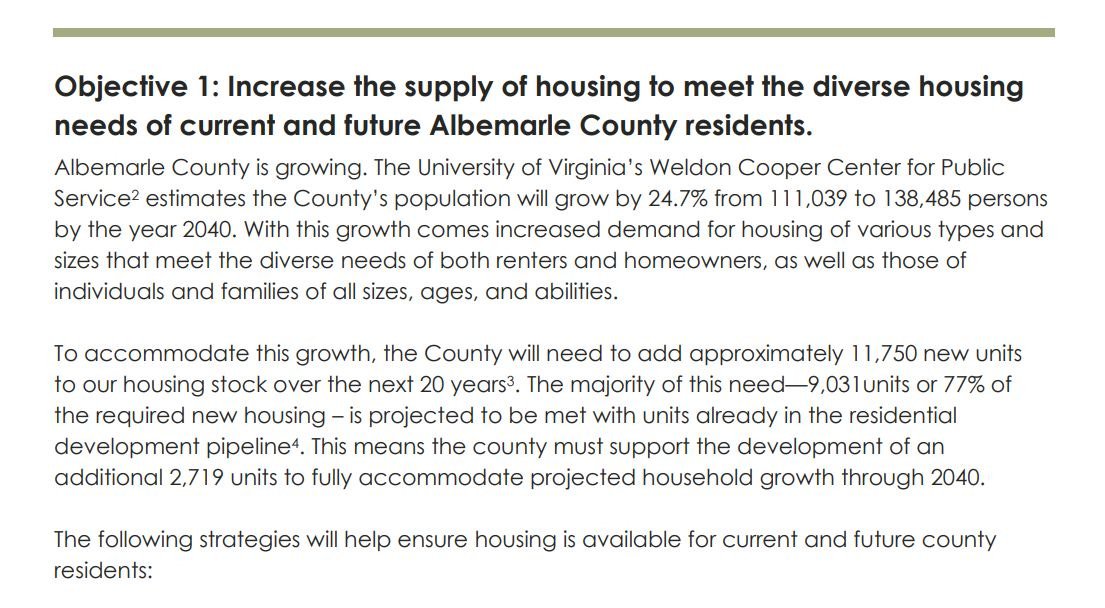
The consent agenda for the January 10, 2024 meeting of the Albemarle Board of Supervisors featured reports on both. Community Development staff issued 451 certificates of occupancy in the county through the first nine months of the year. That’s more than was issued in all of 2015 and 2016 but the county does not appear to be on pace to surpass 2020, when 1,143 certificates were granted. (view the 3rd quarter CO report for 2023)
Switching to building permits, there were 456 issued through 2023’s third quarter, with 333 of them issued during that period. In all of 2015 there were 514 permits issued, and there were 1,342 issued in 2020. That number declined to 838 in 2021 and rebounded to 914 in 2022. (view the 3rd quarter building report for 2023)
These reports also break down the information by magisterial district. Of the 333 residential units issued building permits in the third quarter, 287 of them were in the Rivanna District, and 279 of these are classified as multifamily units. There were a total of six in the Rio District, one in the Jack Jouett District, six in Samuel Miller, 22 in Scottsville, and eleven in White Hall.
There were a total of 63 certificates of occupancy issued in the 3rd quarter, with 32 of these in the White Hall District, sixteen in the Scottsville District, ten in the Rivanna District, four in the Samuel Miller District, one in the Jack Jouett District, and none in the Rio District.
Both reports also break down whether permits were issued in the rural area or the growth area. Through the third quarter of 2023, 85.5 percent of new certificates of occupancy were issued in the development areas.
“Very grateful to see the continual reduced numbers in the rural area because it shows that our plans are working and the plans that were set out by our predecessors in the 80’s and 90’s are working,” said White Hall District Supervisor Ann Mallek.
One speaker at the public comment period called on Supervisors to adjust the growth area boundaries.
“I live down Avon Street Extended where the many housing developments are squished together and were built without adequate school accommodations,” said Susan Perry. “And at the end of my block, there’s nothing but green pretty. It looks kind of surreal. The twenty-year expansion zones are full. You may not think they are full but they’re pretty full.”
Community members can track the progress of the construction of new units through Albemarle’s Development Dashboard. Perry lives within what is classified as Neighborhood 4 which shows 242 units approved but not yet built as of October 1, 2023. These numbers are to be updated quarterly.
In one of these editions, I’ll finally get back to the December 19, 2023 Planning Commission Comprehensive Plan work sessions on growth management.
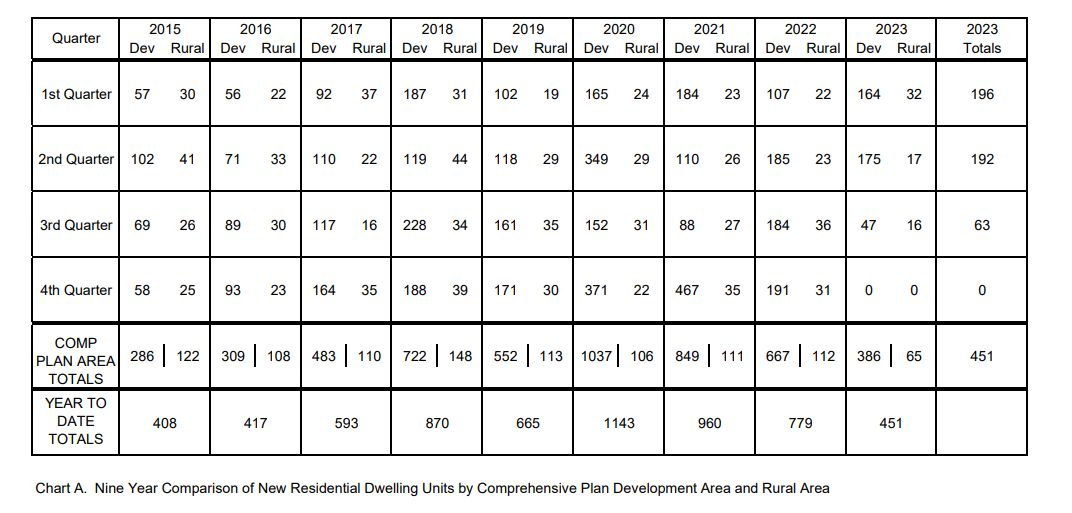
Albemarle Supervisors approve $700K for Premier Circle, $1.5M for Habitat project
The Albemarle County Board of Supervisors has approved the use of money in the county’s housing fund for two projects to subsidize the cost of building affordable units.
“Those two projects are the Premier Circle permanent supportive housing project being developed by Virginia Supportive Housing as well as the Southwood Cardinal Hill Apartments which is being developed by Habitat of Humanity of Greater Charlottesville,” said Stacy Pethia used to have the title of Housing Policy Manager but is now Assistant Director for Housing.
The Premier Circle project is a multi-phase initiative to develop the site of a former hotel on U.S. 29 with 80 units built by VSH as well as a future phase where the Piedmont Housing Alliance will build 60 units. The first phase has run into a budget shortfall, and City Council will hold second reading on approval of $750,000 in funding at their meeting on January 16, 2024.
“The Virginia Supportive Housing project really focuses on that permanent supportive housing project which serves households with incomes between 30 and 50 percent of [the area median income] ,” Pethia said. “So really reaching down to some of our residents and neighbors that have the greatest housing needs.”
For reference, the 2023 area median income for Albemarle was $123,000, according to Albemarle County’s website.
The first phase of Premier Circle will be 80 studio apartments with onsite services to help people with job-training and other ways to move forward with their lives. It will be VSH’s second project in the area after the Crossings at Fourth and Preston were built last decade in Charlottesville.
Pethia said VSH has raised $22.6 million for the project but the costs have continued to increase. She said the request to Albemarle and Charlottesville was $1.4 million. Council was told $1.5 million.
When this $700,000 payment is complete, Pethia said Albemarle’s total contribution will be $4.85 million.
“That includes the $2.4 million that we have allocated to the project through [American Rescue Plan Act] funds a few years ago and approximately $1.75 million which is the estimated worth of project-based vouchers that have been awarded to the project,” Pethia said.
The latter piece of information implements a specific strategy in Objective 10 of the Housing Albemarle plan.
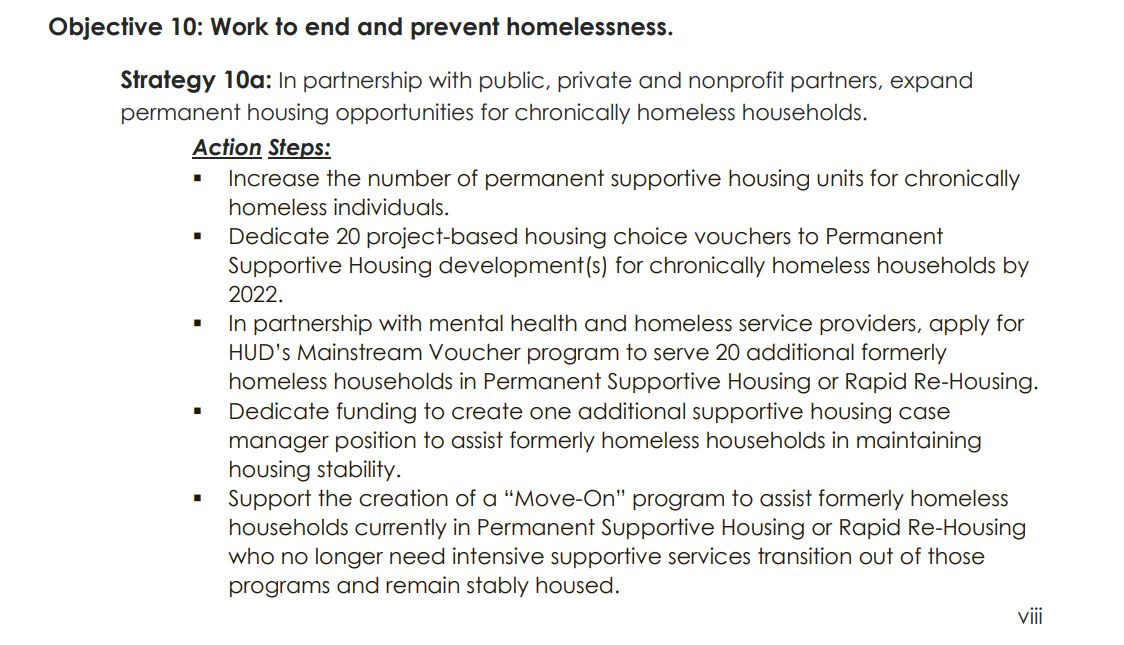
Pethia acknowledged the city contributed $750,000 but that the county’s amount would remain at $700,000.
“We believe given the amount that we’ve already placed in that $700,000 is appropriate
Habitat requested $1.5 million to guarantee that 14 units at Cardinal Hill Apartments in Southwood be kept “deeply” affordable for a longer period of time at a rent of nearly $500 a month compared to $1,200 a month.
“Residents of the original Southwood Mobile Home Park will be given priority access to the Cardinal Hill units, with a focus on avoiding resident displacement during and after the redevelopment process,” reads the staff report.
Pethia said these properties were originally to be sold as condominium units.
“Really the focus is on the hardest to re-house Southwood units so again those who may not be able to purchase a home on own at least right now and senior residents,” Pethia said. “The rents will be affordable at households at or below 80 percent AMI and that range is really to provide some flexibility of the income qualifications for relocation purposes.”
The $1.5 million will guarantee affordability for 30 years and would go directly to pay down a construction loan. Albemarle has already contributed $306,000 for rental relocation assistance for Habitat’s overall Southwood project. She said this would satisfy Objective 2 of Housing Albemarle.
Pethia also said Habitat and county officials are in talks about a performance agreement to guide the county’s investment in phase 2 of the Southwood project. That would let the county know how much funding they will be asked for in the future. She said the two work together for funding opportunities.
“The Governor announced on December 29 the county was awarded [$1,075,000] [Community Block Development Grants] for phase 2 and that will help to install water and sewer lines for 75 houses,” Pethia said.
More about housing in Albemarle County in future editions of the newsletter.
Charlottesville Planning Commission seeks more funding for sidewalks in CIP
The Charlottesville Planning Commission has held its public hearing for the planning document that lays out what infrastructure the city plans to build within the next five years.
At the beginning of the their meeting on January 9, Planning Commissioner Karim Habbab read a statement indicating he would recuse himself from discussions or votes on affordable housing projects because the architectural firm he works for is helping to design projects to be built by Piedmont Housing Alliance.
“I have conferred with the City Attorney’s office and it is their legal opinion that my voluntary disqualification is consistent with the State and Local Conflicts of Interest Act,” Habbab said.
The Planning Commission’s role is to make recommendations for changes to the CIP before City Manager Sam Sanders unveils his proposed budget in early March. The group also had a work session on the draft document in late November. (review the January 9, 2024 presentation)
“This is the same plan that you saw back in November,” Hammill said. “We’ve not made any changes at this point.” said Krisy Hammill, Charlottesville’s director of budget and performance management. “With the CIP, everything that we intend to spend needs to balance with any available revenues.”
Those revenues mostly come from the sale of bonds which are then paid back through debt service payments each year. The city’s AAA bond rating keeps interest rates low.
“Over the five year plan, we’re planning on spending just a little over $136 million dollars,” Hammill said. “Just a little over $81 million of that is intended to be funded with bonds.”
City Manager Sam Sanders said the CIP at this point assumes no increase in the real property tax rate.
Other revenues include state and federal funding for various projects. Another line item is a $4.217 million loan from Southern Development to help cover the costs of upgrading Stribling Avenue. That was a condition of the Planning Commission’s recommendation for approval of a rezoning for up to 170 units between the Fontaine Research Park and Jefferson Park Avenue Extended.
The largest category for spending is in affordable housing with $48,295,000 projected over the next five years. That includes $15 million for the Charlottesville Redevelopment and Housing Authority’s pending redevelopment of Westhaven. The government agency requested that amount last September. That figure also includes $3.15 million for the Piedmont Housing Alliance for their partnership with Woodard Properties at 501 Cherry Avenue.
Transportation is second with $29,262,681. Always keep in mind that Council will only approve the first year’s funding in the CIP when they adopt a budget in April. The out years are for planning purposes.
One item absent from the five-year plan at this time is between $25 million and $30 million for a Pre-K Center at Walker Upper Elementary School. I’ll have more details on that in a future edition of the newsletter from City Council’s joint meeting with the School Board.
Another item not yet funded is the city’s share for renovations at the Jefferson Madison Regional Library’s Central Branch on East Market Street. The partnership agreement for the library system calls for Albemarle and Charlottesville to split the costs for capital improvement for both Central Library and the Gordon Avenue Library.
“We have not proposed it in the FY25 CIP because we don’t have that commitment from the county that they too can do it,” said City Manager Sam Sanders. “We know it is something that both bodies are interested in making happen.”
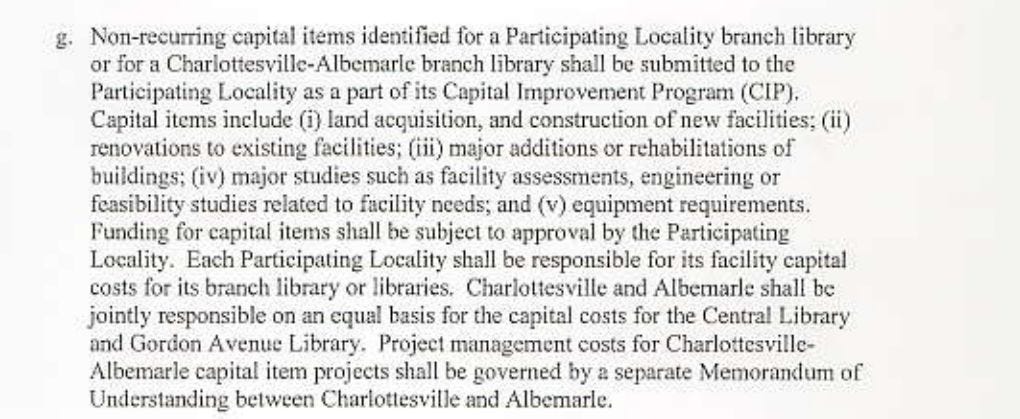
Sanders estimated it may be FY27 before the city can make that outlay. City Councilor Brian Pinkston said he’d like to see the renovations done in the next five years.
“The library in addition to being full of books which I love is also a social component of the city,” Pinkston said.
The first speaker at the public hearing was David Plunkett, the director of JMRL, who said the renovation has been in the works for many years. He requested funding in two different years.
“One year would be architecture and engineering and then the construction itself could begin immediately following,” Plunkett said. “The Central Library has served as the main branch of the Jefferson Madison Regional Library since 1981. The building is co-owned by Charlottesville and Albemarle County and it is the most public building in Charlottesville, I guarantee. It serves this community with doors wide open 68 hours a week.”
The paragraph below was updated on January 20, 2024
Plunkett said the building is over a hundred years old and he thanked the city for helping to make repairs such as renovation of restrooms and the replacement of heating, cooling, and ventilation systems. A current cost estimate is $15.8 million based on a 2015 design created by Train Architects. (view the study)
Two other speakers called on the city to create a land bank so that affordable housing funds could be used to buy property for construction of new units.
Commissioner Rory Stolzenberg said there was not enough funding being put into sidewalk and bike projects.
“As part of the Comprehensive Plan and during our zoning rewrite process, I think we made a process, we the city made a promise to the city, that we would invest in the infrastructure to make the city a more walkable place to help people get out of their cars and a $100,000 a year is just not an investment in that,” Stolzenberg said.
Stolzenberg said the city was setting aside more than that pre-pandemic and he suggested $500,000 for this year working up to $1 million a year in anticipation of the city’s creation this year of a sidewalk priority list.
Commissioner Lyle Solla-Yates said he wants to fund the library, sidewalks, and trails, but said the city has to learn to be more financially sustainable.
“I’m uncomfortable voting for increased spending at this time unless we can figure out a way to fund it,” Solla-Yates said. “That is my concern.”
Commission Chair Hosea Mitchell said this was the seventh capital improvement program he’s reviewed. He agreed with Solla-Yates, and suggested that the Planning Commission’s recommendation to Council would be to morally support projects and leave it up to elected officials to secure funding.
“Not necessarily lend an amount to what we’re asking but to ask Council as they begin deliberating to finding money for things like sidewalks, and finding money for the library, and begin finding money for land banks and land trusts,” Mitchell said.
The Commission voted 6-0 on a motion to recommend the CIP budget with amendments similar to what Mitchel had said as well as two requests. One is to restore new sidewalk levels to pre-pandemic levels and the other is to fund at least the design of the Central Library renovations.
Second shout-out: Charlottesville Jazz Society
In today’s second subscriber supported public service announcement, the first few notes of 2024 have now been played and the Charlottesville Jazz Society has all the details you need to learn where the best ones can be heard this month.
Check out the event calendar at cvillejazz.com to learn what’s coming up beginning this Wednesday with the Charles Owens Trio playing at Common House at 6:30 p.m. and ending with the Society’s Local Jazz Spotlight Series at Miller’s on Sunday, January 28. This month will feature The Royce Campbell Trio with Royce Campbell on guitar, Bob Bowen on bass, and Jim Howe on drums.
The Charlottesville Jazz Society is also seeking assistance with efforts to house out-of-town performers. A previous sponsorship with a local hotel has ended, so the Society is hoping for new donors who might be willing to be Hotel Heroes to help continue the flow of talent who comes to Charlottesville to play. Visit cvillejazz.org to learn more!
Soil and Water 101: Nelson Supervisors learn more about Thomas Jefferson conservation district
In the 1930’s, a series of dust storms plagued the drought-ridden United States of America, caused in part by decades and decades of poor management of topsoil and exploitative agricultural practices. As one remedy, new arms of state governments were created nationwide, including the Thomas Jefferson Soil and Water Conservation District.
“We were formed in the 1930’s out of the Dust Bowl and one of the primary differences with a conversation district versus a non-profit or another government agency is that we have local elected directors,” said Anne Coates, the executive director of the TJSWCD.
The Thomas Jefferson district has been in operation since 1939. Coates and other staff members gave an overview to the Nelson County Board of Supervisors on January 9.
Mark Campbell and David L. Collins won election in November to the two seats that represent Nelson County. Soil and Water Conservation Districts do not have any taxation authority, but do help distribute revenues from state and federal sources.
Coates said the Thomas Jefferson Soil and Water Conservation District is geographically the second largest in the district.
Luke Longanecker is the conservation programs manager.
“What I do and what my team does is that we work one on one primarily with farmers and landowners in Nelson County and three other counties in our district to get to know them, and their operations, what’s working, what’s not working, and try to come up with technical resources, grant funds, and educate them a lot on best practice, and just try to help them improve their herd, their land management, anything we can assist them with,” Longanecker said.
Part of the mission is to help implement efforts to conserve soil and improve water quality. For instance, there are funds available for farmers to keep livestock out of waterways using exclusion fences.
“I do want to highlight that all of these programs are voluntary,” Longanecker said. “Farmers call us for assistance. We are non-regulatory and we do not want to get regulatory. We are here to help and answer questions and provide assistance in whatever we can.”
Since 1998, the District has provided $2.9 million in cost-share funds for Nelson County landowners, which translates to over 55 miles of stream bank protected, 353 acres of trees planted, and 6,690 acres of cover crop planted. All of that funding goes into the local economy.
“It’s an economic boost in a lot of ways from farmers to contractors to well-drillers to Lovingston From Supply to the Colleen Feed and Seed to the hardware store in Nelson and beyond,” Longanecker said.
Landowners also provided their share of funding as well. At the moment there are 36 approved projects in Nelson totaling $1,271,120.
Other projects the Thomas Jefferson Soil and Water Conservation District is involved with include a project called a TMDL for the Tye River. That stands for Total Maximum Daily Load and it is a way of determining how to improve water quality by restricting pollutants from entering waterways.
“We were able to work with [the Virginia Department of Environmental Quality] to get them to provide a stable funding source for not only agricultural but for septic [projects] as well,” Longanecker said. “That is repairs, replacements, connections to public sewer.”
That reduces the amount of nitrogen that enters the watershed.
Supervisor Jesse Rutherford said the conversation about septic fields is important in Nelson County.
“One unique attribute that we have is that we require 100 percent reserve drainfields and for Board members who don’t understand that, that basically means there’s a 100 percent reserve in the event the first fails,” Rutherford said. “It’s a very important practice because a lot of counties I think are at 50 percent or 75 percent and if you have a situation where it’s a three bedroom septic system but you have eight people in one house, that reserve is going to become very important because it takes into consideration of expansion.”
Coates said there are also educational programs to help students understand the importance of being a good steward of the land. There’s also a program to help homeowners pay for improved stormwater management systems.
Reading material:
13 things to watch in the 2024 Virginia General Assembly session, Virginia Mercury, January 10, 2024
Virginia districts roll on with electric school buses despite lack of state funding, Elizabeth McGowan, Energy News Network, January 11, 2024
Wawa recognized as outstanding community partner for ACPF, Sarah Allen, CBS19, January 11, 2024
Charlottesville law enforcement reverses course: School district 'appropriately' handled sexual assault allegation, Jason Armesto, Charlottesville Daily Progress (paywall), January 12, 2024
State data shows ongoing teacher shortage in Virginia, Anna Bryson, Richmond Times-Dispatch (paywall), January 12, 2024
Earlysville hit-and-run driver to participate in 'restorative justice' program, avoids jail time, Hawes Spencer, Charlottesville Daily Progress (paywall), January 13, 2024
New signal components to be installed near Belmont Bridge, CBS19, January 15, 2024
New owner says there will be changes at Michie Tavern, but not for staff, Jason Armesto, Charlottesville Daily Progress (paywall), January 15, 2024
Charlottesville Martin Luther King Jr. celebration spotlights a future generation of change-makers, Jane Sathe, Charlottesville Daily Progress (paywall), January 15, 2024
#625 is no longer alive so now let’s archive!
Are four segments too long? Should one of them have been postponed to the next edition? We’ll never know, because this one has been put to bed and now it’s time to get on to the next one and the one after that, so on until whenever the last number is called. How will you know?
For now, the official place for news on production is my Notes page on Substack. This may change in the future, but it’s what seems to make sense for this moment.
All of these moments researching and producing the newsletter and podcast are covered by paid subscribers either through Substack or through Patreon. I’m going to do a fun project on Patreon soon related to my own love of improvisational experimental sound. A little teaser is at the end of today’s edition because… why not?
Ting will match your initial subscription through Substack.
If you sign up for Ting at this link and enter the promo code COMMUNITY, you’ll get:
Free installation
A second month for free
A $75 gift card to the Downtown Mall





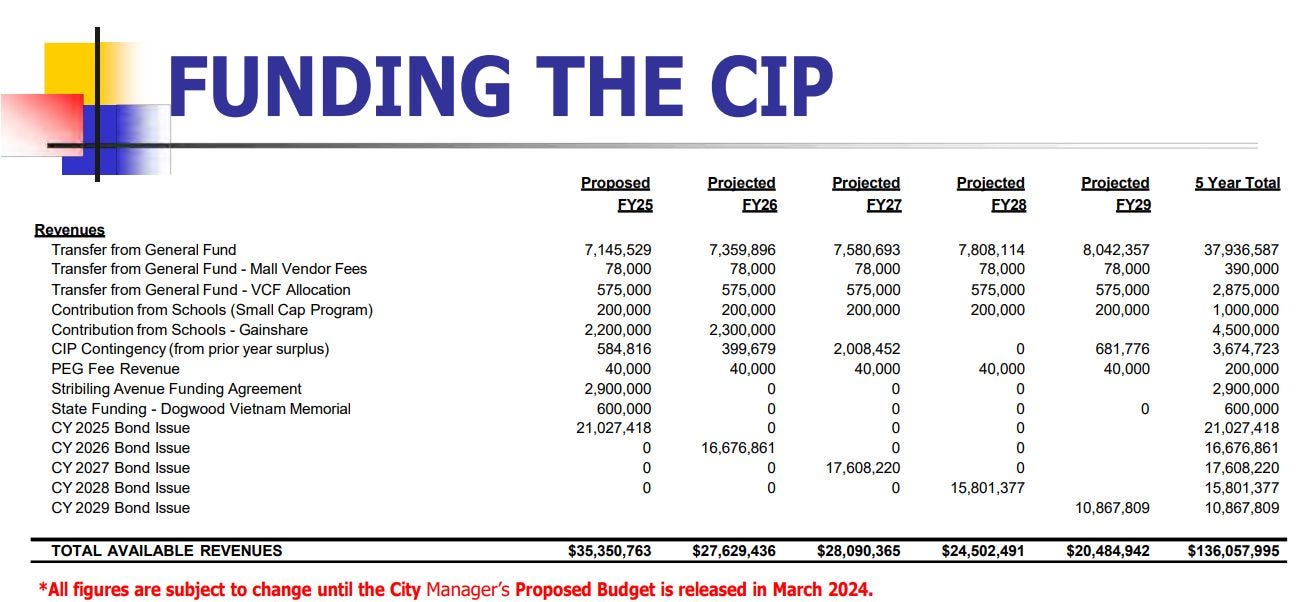












Share this post